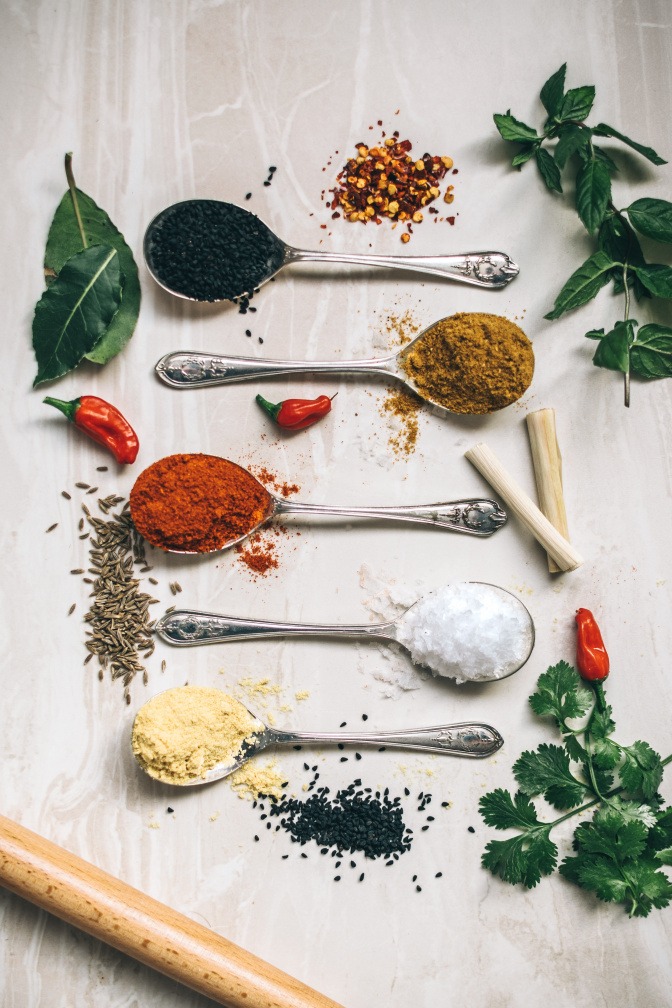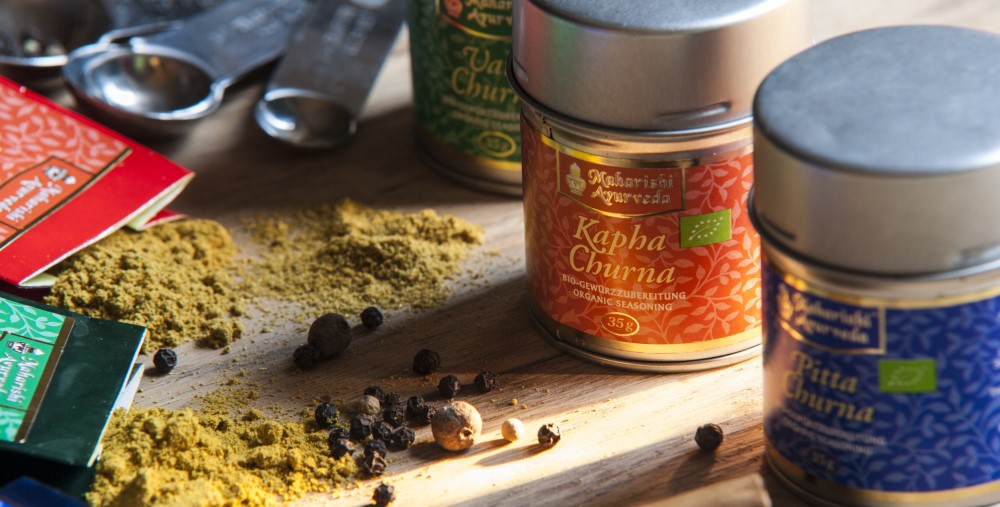Spices - power plants for the digestive system
An essential characteristic of the "Ayurvedic diet" is the generous use of spices. This does not mean (only) salt and pepper, but the entire variety of local herbs and exotic flavors. They are not only used as flavor enhancers, but as individually adaptable means to strengthen and balance the digestive fire Agni. This is especially important now in spring. After the cold season, the digestive fire is still weak. According to the annual cycle, spring is the time of growth and multiplication. For this we need a particularly strong digestive fire. That is why the use of strong flavors and warming spices is important in this season.
In modern cuisine, snacks and common gastronomy, the use of chemical flavor enhancers such as glutamate is very common. The addition of glutamate causes a lack of perception of satiety. This can easily lead to addictive eating behavior.
Yet it is easy to create delightful flavors with local herbs and exotic spices that bring about the experience of satisfaction through food.
Different needs
Depending on the stressful situation, different deficiencies can occur in the digestive system.
Vata
 Vata dominates during stress, tension, irregular meals, lack of food intake and great hunger. This leads to disturbances in the digestive system, which are mainly perceived as air accumulation and cramps. The air may manifest as flatulence, belching, distended abdomen or strong gurgling in the stomach. The cramping can vary in intensity, ranging from mild "abdominal twinges" to colic. For these symptoms, spices that are antispasmodic and anti-flatulent are especially important. These include fennel, caraway, anise, coriander, cumin and black cumin. Warming spices such as ginger and black pepper also improve the composition of digestive juices and can be antispasmodic.
Vata dominates during stress, tension, irregular meals, lack of food intake and great hunger. This leads to disturbances in the digestive system, which are mainly perceived as air accumulation and cramps. The air may manifest as flatulence, belching, distended abdomen or strong gurgling in the stomach. The cramping can vary in intensity, ranging from mild "abdominal twinges" to colic. For these symptoms, spices that are antispasmodic and anti-flatulent are especially important. These include fennel, caraway, anise, coriander, cumin and black cumin. Warming spices such as ginger and black pepper also improve the composition of digestive juices and can be antispasmodic.
Pitta
Pitta dominates in cases of excessive ambition (professional as well as athletic), frequent consumption of stimulants such as alcohol, coffee, black tea, very hot spices and carbonated drinks, influence of violent emotions and hot climate. Then the digestive juices become too sharp and too acidic. This causes the mucous membranes of the digestive tract to become overstimulated and prone to inflammation. The result is gastritis and irritable bowel syndrome, food intolerances and all the ailments that doctors have recently dubbed "leaky gut".
According to Ayurveda, bitter and tart medicinal herbs and spices in particular bring cooling and relief to irritated mucous membranes. Domestic kitchen herbs such as sage, rosemary, thyme and marjoram are cooling, as are the exotic spices cardamom, coriander and turmeric. .
 Kapha
Kapha
Too frequent and too abundant meals, sweets in excess, lack of exercise due to a sedentary lifestyle lead to a weakening of the digestive fire, as do the Kapha times of the day and year (which is the evening after sunset and spring). Vital nutrients then cannot be properly processed. Subjectively, one feels heaviness, dullness and fatigue after eating. If this condition persists for a long time, obesity and metabolic diseases such as diabetes and elevated blood lipids occur. In this situation, in addition to reducing food intake, the use of hot and warming spices is the best prescription. These include ginger, black pepper, cinnamon, cloves and chilies as exotic spices, all the allium plants such as onion, chives, wild garlic and garlic as native medicinal plants. The allium plants should be used roasted in ghee, especially in case of additional Vata influence.
Amount of spices
All these spices are commonly known in our country. A significant difference from the domestic cuisine is the amount of spices commonly used in Ayurveda. Many people have stored an abundant use of spices as "harmful". This may be true if strongly heating spices are used for Pitta complaints or cooling spices for Kapha complaints. Such incorrect use logically leads to unfavorable effects.
However, the right spices for appropriately predominant doshas in the digestive system are always a great blessing! They cause the digestive fire to be activated in the right direction. If you are unsure about the predominant dosha in your digestive system, take our dosha test now. .
Spice Blends 
To get to know the effects of the described spices, it is recommended to use ready-made mixtures. The mild-warming and anti-flatulent Vata Churna balances an irregular digestive system prone to aeration and cramps. The cooling, mildly aromatic Pitta churna is gentle on the mucous membranes of the digestive tract while giving a subtle exotic flavor. The strongly warming and activating Kapha-Churna eliminates heaviness and stagnation in the gastrointestinal tract.
Zusammenfassung
Die reichliche und großzügige Verwendung von Gewürzen ist ein wichtiges Charakteristikum der ayurvedischen Ernährung. Diese unterscheidet sich drastisch von der bei uns üblichen Vorstellung von „indischer Küche“ mit übermäßiger Verwendung von scharfen und stark erhitzenden Gewürzen und Chilisoßen.
Wichtig ist die Dosha-gerechte Anwendung der Gewürze sowohl bei Süßspeisen als auch bei pikanten Gerichten. Dosha-gerecht bezieht sich vor allem auf den Essenden, aber auch auf die Tages- und Jahreszeiten.

We look forward to your feedback!